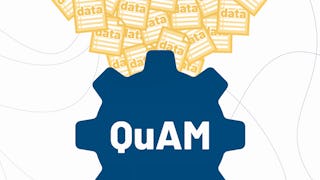Filter by
SubjectRequired
LanguageRequired
The language used throughout the course, in both instruction and assessments.
Learning ProductRequired
LevelRequired
DurationRequired
SkillsRequired
SubtitlesRequired
EducatorRequired
Explore the Random Forest Course Catalog

Northwestern University
Skills you'll gain: Image Analysis, Digital Communications, Computer Vision, Data Processing, Visualization (Computer Graphics), Medical Imaging, Electrical and Computer Engineering, Motion Graphics, Linear Algebra, Color Theory, Bayesian Statistics, Applied Mathematics, Sampling (Statistics), Algorithms

University of London
Skills you'll gain: Education Software and Technology, Learning Management Systems, Collaborative Software, Test Tools, Content Management Systems, Security Software, Video Production
 Status: Free Trial
Status: Free TrialKennesaw State University
Skills you'll gain: Six Sigma Methodology, Root Cause Analysis, Process Analysis, Probability Distribution, Process Capability, Statistical Process Controls, Lean Methodologies, Probability & Statistics, Process Improvement, Quality Improvement, Process Mapping, Statistical Analysis, Systems Of Measurement, Risk Analysis
 Status: Free Trial
Status: Free TrialAlberta Machine Intelligence Institute
Skills you'll gain: Data Ethics, MLOps (Machine Learning Operations), Business Operations, Machine Learning, Ethical Standards And Conduct, Operational Analysis, Applied Machine Learning, Business Strategy, Production Planning, Data Maintenance, Maintainability, Risk Mitigation, Performance Metric, Systems Integration, Stakeholder Communications
 Status: Free Trial
Status: Free TrialWesleyan University
Skills you'll gain: Classification And Regression Tree (CART), Decision Tree Learning, Predictive Modeling, Random Forest Algorithm, Applied Machine Learning, Predictive Analytics, Unsupervised Learning, Machine Learning, Supervised Learning, Data Analysis, Data Mining, Feature Engineering, Exploratory Data Analysis, Regression Analysis, Statistical Analysis, Statistical Methods

Coursera Project Network
Skills you'll gain: PyTorch (Machine Learning Library), Image Analysis, Deep Learning, Artificial Neural Networks, Machine Learning Methods, Medical Imaging, Computer Vision, X-Ray Computed Tomography
 Status: Free Trial
Status: Free TrialUniversity of California San Diego
Skills you'll gain: Exploratory Data Analysis, Apache Spark, Big Data, Regression Analysis, Data Mining, Applied Machine Learning, Statistical Analysis, Machine Learning, Data Analysis, Unsupervised Learning, Data Transformation, Predictive Modeling, Data Cleansing, Supervised Learning, Decision Tree Learning
 Status: Free Trial
Status: Free TrialUniversity of Colorado Boulder
Skills you'll gain: Business Analytics, Risk Analysis, Business Analysis, Decision Making, Analytics, Business Intelligence, Predictive Analytics, Simulation and Simulation Software, Business Modeling, Data Analysis, Process Optimization, Market Analysis, Unsupervised Learning, Microsoft Excel, Probability Distribution
 Status: Free Trial
Status: Free TrialUniversity of Alberta
Skills you'll gain: Reinforcement Learning, Sampling (Statistics), Machine Learning Algorithms, Simulations, Artificial Intelligence and Machine Learning (AI/ML), Machine Learning, Algorithms, Probability Distribution
 Status: Free Trial
Status: Free TrialUniversity of Washington
Skills you'll gain: Classification And Regression Tree (CART), Applied Machine Learning, Supervised Learning, Predictive Modeling, Text Mining, Machine Learning Algorithms, Data Cleansing, Scalability, Machine Learning, Natural Language Processing, Big Data, Probability & Statistics, Algorithms
 Status: Free Trial
Status: Free TrialJohns Hopkins University
Skills you'll gain: Biostatistics, Statistical Visualization, Epidemiology, Medical Science and Research, Quantitative Research, Descriptive Statistics, Statistical Methods, Data Literacy, Probability Distribution, Public Health, Statistical Analysis, Clinical Trials, Sample Size Determination
 Status: Free Trial
Status: Free TrialUniversity of Pennsylvania
Skills you'll gain: Risk Modeling, Probability Distribution, Mathematical Modeling, Statistical Modeling, Risk Management, Data Visualization, Predictive Modeling, Data Modeling, Probability & Statistics, Risk Analysis, Simulation and Simulation Software, Forecasting, Data-Driven Decision-Making, Business Analysis, Process Optimization, Microsoft Excel
In summary, here are 10 of our most popular random forest courses
- Fundamentals of Digital Image and Video Processing: Northwestern University
- Get Interactive: Practical Teaching with Technology: University of London
- Six Sigma Tools for Analyze: Kennesaw State University
- Optimizing Machine Learning Performance: Alberta Machine Intelligence Institute
- Machine Learning for Data Analysis: Wesleyan University
- Detecting COVID-19 with Chest X-Ray using PyTorch: Coursera Project Network
- Machine Learning With Big Data: University of California San Diego
- Business Analytics for Decision Making: University of Colorado Boulder
- Sample-based Learning Methods: University of Alberta
- Machine Learning: Classification: University of Washington










